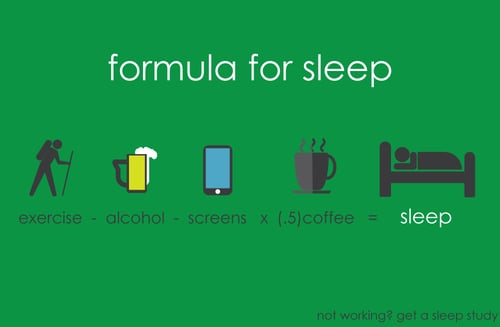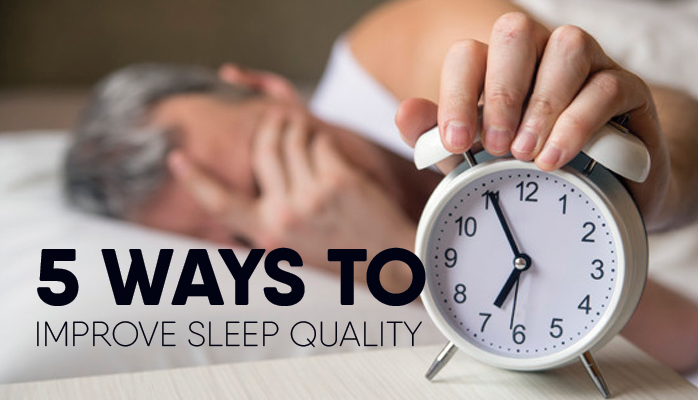Improving Sleep Time/Quality Takes Effort in 21st Century
As great as modern technology and global access to goods and services are, they have made it significantly harder to get a good night’s rest. It’s reasonable to assume that people 100 years ago probably slept better and longer than people today.
Why? Common reasons people don’t get quality sleep or sleep long enough are:
- Media before bed time
- Diet
- Too much light
- Too much noise
- Too much energy
- Medical conditions (insomnia, sleep apnea)
All of these points affect our ability to regulate melatonin production (the hormone that regulates sleep). In practical terms, this list points out that in our environment, we are surrounded by things that keep us from getting the sleep we need:
- Phones, laptops, tablets, and TVs in the bedroom;
- Unlimited access to coffee;
- Alcohol;
- Lights and noise from gentrified; and
- Sitting in a chair all day at work.
In the 21st century, you need to make a concerted effort to get better sleep. Let’s look at 5 easy ways to improve sleep time and quality.
1. No Media Before Bed
As much fun as it is to play Candy Crush, go down a Wikipedia hole, or scroll down Instagram before bed, it’s hurting your ability to sleep well. LEDs are the light of the 21st century, and they brighten every hand-held device we have:
- Smart phones
- Laptops
- Tablets
- TVs
Unfortunately, LEDs emit blue light. The problem with blue light is that it suppresses melatonin production. No melatonin, no sleep. Blue light also suppresses delta brainwaves (which induce sleep) and boosts alpha wavelengths (which create alertness) [What's in a Color? The Unique Health Effects of Blue Light].
Before bed fix your eyes on a book, magazine, or something other than a blue screen, and you may feel significantly more rested in the morning.
2. Limit Coffee Drinking
Coffee is 21st century fuel. Nearly all of us drink coffee to get going in the morning, or to keep going during the day. Fortunately, coffee does a great job at keeping our energy up. Unfortunately, coffee does a great job at keeping our energy up.
If you are having trouble sleeping, look at your coffee drinking habits.
- How much coffee are you drinking?
- When are you drinking coffee?
Drinking too much coffee or drinking coffee too late in the day can significantly decrease your ability to fall asleep when you want to.
Some people are particularly affected by caffeine. The point here is to know what your limit is. Maybe it’s only two cups per day, maybe it’s no coffee after noon. While many people say that coffee doesn't impact them, the real question is what percentage of people who say that also have trouble going to sleep?
3. Limit Alcohol Before Bed
As great as a glass of wine before bed can be to relax, it’s not going to help you get a good sleep. Alcohol has a unique ability to make you pass out without actually giving you a good night’s rest.
Try to avoid alcohol in the hours leading up to bed time because alcohol [Sleep Foundation]:
- Can interrupt your circadian rhythm
- Blocks REM sleep (i.e., the “restorative” part of your sleep that makes you feel rested)
- Can aggravate breathing problems, such as sleep apnea
- Is a diuretic, and can give you extra night time bathroom trips
As with coffee, different people have different sensitivities. The point here is that before bed, avoid alcohol and you are likely to get a better rest.

4. Exercise
A great majority of us spend most of our day siting down, driving to work, and sitting at a computer. Obviously, these “activities” aren’t all that great at helping us release energy. Getting a lot of aerobic exercise is a simple way to dramatically improve sleep time and quality.
Not only does exercise exhaust our energy reserves, but if you time it right you will give an initial spike in core body temperature, followed by a core temperature decrease which signals your body to shift into sleep mode. Interestingly, a hot bath before bed simulates the same physiological response: core spike followed be decrease.
Many people will benefit from exercising in the morning or afternoon, but exercising at night may also be acceptable for some people.
5. Get a Sleep Study
For some of us, no amount of alcohol reduction, coffee reduction, screen time reduction, or exercise are going to help us get a good night’s rest because there is an underlying medical condition, such as:
- Sleep apnea
- Insomnia
- Parasomnias
If you feel like you have tried making all of the right lifestyle choices for good sleep but still can’t achieve that, you may consult with a sleep professional and get a sleep study. This will help you:
- Understand your sleep behavior
- Diagnose underlying conditions that affect sleep
- Start the path to getting regular, good sleep
Please click the link below to set up your sleep study consultation now with one of our sleep health professionals.
Get Sleep Study Consultation Now
Main Image by Dragana_Gordic

